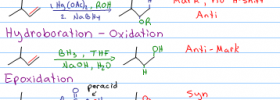 Have you ever found yourself investing a great deal of time into reading your notes, only to realize that you don’t remember a word of what you just read?
Have you ever found yourself investing a great deal of time into reading your notes, only to realize that you don’t remember a word of what you just read?
Do you find yourself investing a great deal of study time, but it doesn't appear to help?
You may be attempting to study passively, and your brain is simply refusing to absorb the desired information. The trick then is tell your mind that this is serious, and encourage your brain to actively study and retain the information.
Engaging your Mind
When you study, it is important to involve multiple senses, to actively engage in reading and learning the material. This tells your brain, “Yes, I am now actively reading, please try to absorb this information.” When you approach exam preparation in this manner, you are more likely to remember the material now, and retain it in your long term memory.
Limiting outside distractions
Before you can begin to actively read and study, you have to limit outside distractions. When you attempt to multi-task, your brain will try to concentrate on many tasks at the same time. But when your ultimate goal is the absorption and long-term retention of information, you need to ensure that there are no outside factors competing for your time and attention.
This means studying in a quiet place, without TV, radio, phone, food, friends… nothing.
Some people do study better with music, but even so, try to listen to music without lyrics, or music you are familiar with, so that your mind is not distracted by what you are listening to.
Engaging Your Senses for Active Reading and Studying
Skimming your notes potentially engages your sense of sight. But the more senses you involve in studying, the more you participate in active reading, the more your brain is focused on the material, and thus the more likely you are to remember what you read.
Reading Out Loud
When you read out loud, you engage not only your mind, but also your sense of hearing. Yes, even if it is your own voice you are listening to. When you verbalize the material you pay more attention to the words, you hear how they sound, and you pay attention to the feel of the words in your mouth. Reading aloud also forces you to read slower, thus paying more attention to the topics and concepts.
It may be weird at first, so perhaps you can pretend that you are teaching the material to a classmate or friend. Picture someone seated next to you, and tell them what you are studying as if it’s up to you to help them pass the exam, using material they’ve never encountered previously.
Even more beneficial is having a real listener hear you out as you explain what you are reading. Just make sure this someone is not trying to be too involved by asking you time-wasting and meaningless questions.
Back in college, I used to study and read out loud by ‘teaching' my parrot the material at hand. I'd let him sit on my shoulders, and simply study out loud, talking through topics like DNA recombination, and the exploits of Napoleon in Europe. My silly bird would cock his head with apparent interest, probably thinking he was the luckiest bird alive for getting round the clock attention.
This also works with dogs or cats, as long as they know how to sit and listen.
Take Notes as You Read
When you write, you not only engage your hands, but also the portion of your brain that translates and processes information. This works very well when you are trying to study directly out of a textbook. The book may take pages and pages to explain a simple concept, with many irrelevant sentences and paragraphs you probably just want to glance over.
To ensure that you pay attention, keep a notebook or piece of paper handy. After reading a paragraph, stop to think about what you read, and make some quick notes. Knowing that you will have to summarize the paragraph forces you to pay attention to the key concepts rather than simply glancing over the material.
When you have finished reading the chapter, not only will you remember what you’ve read, but you will also have a short handy summary to review down the line, in place of reading the entire chapter AGAIN.
Test Yourself
Don’t assume that you understand the information just because you have finished reading a concept. Instead, prove it to yourself. Ask yourself questions based on the information you’ve studied, and see how well you can answer. You can invent these questions based on your notes, or study a set of questions taken from your textbook or homework problems.
When you get stuck on a question that you cannot answer, you will feel slightly let-down and curious at the same time. This will make you pay greater attention to the information when you research the correct answer, and thus less likely to get the same question wrong a second time. If you are studying with a friend, take turns testing each other. Not only will you learn from your mistakes, but you will also benefit from explaining the correct answer to your study partner.
Pacing
This method doesn't work for all students, but you won’t know until you try it.
When you move around you increase your heart rate and blood circulation. This makes your body and metabolism work faster. While ultimately a subtle difference, this actually makes your brain work faster and sharper too.
So, if you are pacer, and have a few pages of notes to study, find a quiet room and take your notes for a circular walk (just make sure there is no one around, lest they think you've lost your mind). Your pacing should be slow, and slightly absent-minded, with the focus being on active reading and studying. As you walk around, read your notes out loud, and then summarize them in your own words. The walking will keep your mind active and help you process and retain the information better than simply sitting on the couch trying to passively absorb the information.
Do you have another method that you use for active reading and studying? If so I would love to read about it in the comments below.


